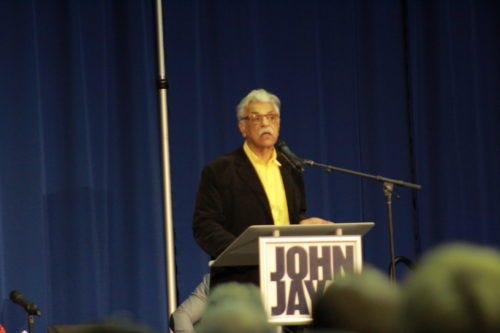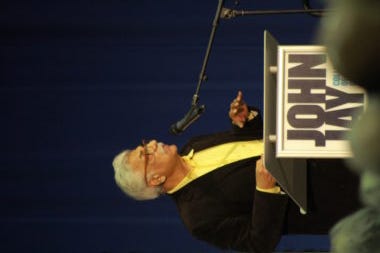Tariq Ali on the Middle East: Left Forum Day 1
During his address at Left Forum’s Opening Plenary, Tariq Ali remarked on the current state of the Middle East and the historical conditions created over the past ten decades that have led to the region’s volatility.
[A]li began by pointing to the post-Ottoman Empire arbitrary drawing of nation borders in 1916.
“Before that happened, the Middle East was an Arab region, dominated by large cities,” he explained. “One could go to primary school in Amman, secondary school in Jerusalem, and college in Cairo or Damascus.”
Borders, to the extent they existed, were porous. The Ottomans ruled in a very hands-off manner, Ali explained. But this all changed when the empire fell and the Western powers reshaped the area.
[T]he Sykes-Picot Agreement, which determined the new borders, has been a disaster for the Middle East. Ali said the borders were drawn so arbitrarily, they were literally divided in the sand with a stick.
And now, the imperial process continues with the new empire, the United States.
This empire, Ali said, is re-dividing the Middle East and causing massive upheavals in the region and the world because of it.
Ali said the US’s war on terror has created instability in Afghanistan and neighboring countries. Drone attacks in Pakistan are wrecking the social fabric of the country completely. But Iraq, he said, is the most glaring example of US imperialism’s after-effects.
[A]li pointed to Iraq, post-invasion. The US was thoughtless in its plans for what came after the bombs fell, he said.
“Even after the Third Reich, the US retained some of the security personnel to help run the country,” he said, “But in Iraq, no.”
This led to the continuation of the war, the displacement of millions, and the current situation in Iraq and Syria where the Islamic State, the US, Russia, and other powers are battling for position and dominance.
“When a country is occupied, that has a damaging effect on the psyche,” Ali said. “Few people think Iraq will survive as a country now.”
Ali closed with a rhetorical question to the crowd.
“Who in the US,” he asked, “is punished for the war in Iraq?”





